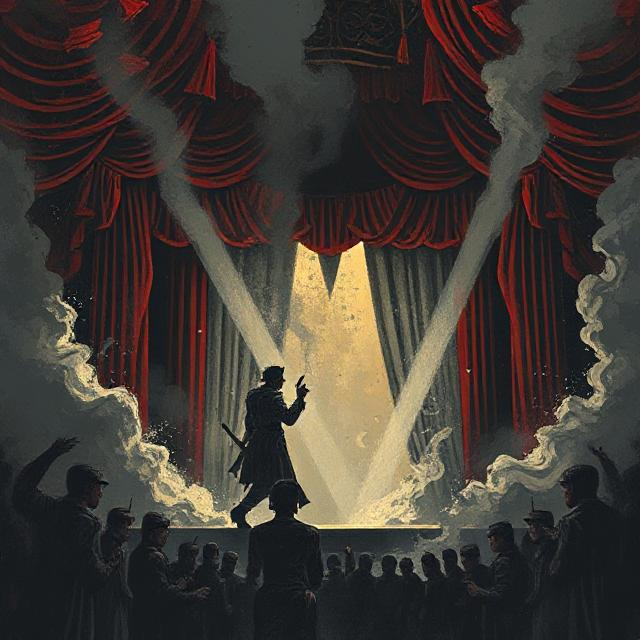
Unmasking the Theater of Power
Michel Foucault’s exploration of ‘truth’, ‘power’, and ‘madness’ offers a provocative framework to dissect 21st-century statecraft, foreign policy, and diplomacy.
To deepen this critique, integrating Freudian psychoanalysis and Marxist materialism reveals how states weaponize narratives, suppress dissent, and enforce hierarchies in global affairs.
Central to this analysis is how truth operates as a tool of power. For Foucault, ‘truth’ is not neutral but a social construct shaped by power. States and institutions produce “regimes of truth” to legitimize authority.
In the realm of foreign policy, dominant powers frame interventions, sanctions, or alliances as morally or rationally necessary, masking strategic interests. For example, claims of “spreading democracy” or “countering terrorism” often conceal economic or geopolitical aims.
Here, Marxist theory aligns seamlessly: ruling classes use ideological narratives (truths) to justify exploitation, such as framing resource extraction as “development.”
Adding nuance, Freud suggests states, like individuals, repress uncomfortable truths (e.g., colonial histories) to maintain psychological stability, projecting guilt onto external “enemies.”
Building on this interplay, Foucault links ‘madness’ to power by showing how societies exclude “irrational” voices to affirm their own rationality.
In statecraft, labeling adversaries or dissenters as “irrational,” “rogue,” or “terrorist” delegitimizes their demands. This mirrors Freud’s concept of repression: states disavow their own contradictions by pathologizing critics.
Extending this further, Marxist analysis argues capitalism’s crises are reframed as the “madness” of failed states or unruly populations, diverting blame from systemic inequality.
Consequently, diplomacy becomes a theater where “rational” powers (often Western) discipline “irrational” actors, enforcing compliance through sanctions or isolation.
Equally revealing are Freud’s theories of the unconscious, which expose how states, like individuals, act on hidden drives. For instance, nationalist rhetoric often channels collective anxieties (economic decline, cultural change) into aggression toward outsiders—a form of ‘projection’.
Similarly, Freud’s “return of the repressed” explains why historical traumas (wars, imperialism) resurface in diplomatic tensions, such as Russia’s invocation of past humiliations to justify expansionism.
Marx complements this: material interests (resources, markets) underpin such psychological dramas. Capitalist states, driven by profit, manipulate truths to justify militarism or neoliberal reforms, while masking class exploitation as “globalization.”
Today, states surveil citizens and rivals alike, using data to control narratives and punish dissent. Notably, social media algorithms amplify state-sanctioned truths while silencing “mad” counter-narratives as “disinformation.”
Here, Freud’s “superego” manifests in the internalized surveillance of citizens, who self-censor to avoid social or legal reprisal. Meanwhile, Marxist critics note that tech giants, aligned with state power, commodify data, turning truth into a privatized asset.
As a result, diplomacy adapts: cyber-espionage and AI-driven propaganda redefine “madness” as resistance to digital hegemony.
Yet Foucault insists power invites resistance. Across the globe, marginalized states and movements challenge dominant truths, exposing hypocrisy in claims of “human rights” or “rule-based orders.”
In a Freudian twist, the “return of the repressed” recurs as grassroots movements (e.g., climate activists) force elites to confront suppressed ecological truths.
Similarly, Marx highlights class solidarity across borders, as workers resist neoliberal diplomacy that prioritizes capital over people. Even within madness, Foucault finds subversion: acts of defiance—whistleblowing, protests—rupture the illusion of state omnipotence, revealing truth as a battleground.
Ultimately, Foucault’s triad—truth, power, madness—exposes statecraft as a performance where rationality and irrationality are strategically assigned. While Freud’s lens uncovers the psychological underpinnings of state behavior, Marx ties these dynamics to material exploitation.
The theater of power thrives on spectacle, where authority is performed to mask instability. Consider how leaders and institutions stage crises, manipulate data, and weaponize AI to project infallibility, turning governance into a scripted drama. Artificial intelligence amplifies this performance: algorithms curate “realities” that validate state narratives, while surveillance systems enforce compliance under the guise of security.
Yet this reliance on technology exposes a paradox: the “rational” tools of control—predictive policing, social scoring, automated diplomacy—often reflect the irrationality of those in power.
Obsessed with omnipotence, elites mistake data for truth, reducing human complexity to inputs and outputs. The result is a detached, algorithmic madness—a delusion of precision that ignores the chaos it fuels.
At its core, the madness of power lies in its self-destructive logic. Increasingly, leaders, insulated by AI-driven echo chambers, grow paranoid, viewing dissent as glitches to be erased. Authoritarian regimes, for example, deploy deepfakes and disinformation to gaslight populations, eroding collective trust. Meanwhile, neoliberal states outsource policy to opaque AI systems, divorcing accountability from action.
In Foucauldian terms, power’s irrationality is pathologized as sanity, while resistance is labeled lunacy. Yet this theater cracks: grassroots movements exploit digital tools to expose contradictions, reclaiming truth from algorithmic control. The real madness, therefore, is not in the people, but in power’s futile attempt to automate legitimacy—a performance destined to collapse under its own absurdity.
Summing up, 21st-century diplomacy reveals a world where truths are weaponized, madness is politicized, and power operates through invisible networks.
To navigate this, critical scholarship must dissect the myths of neutrality, confront repressed histories, and amplify voices excluded as “mad”—not as a flaw in the system, but as its most revealing critique.